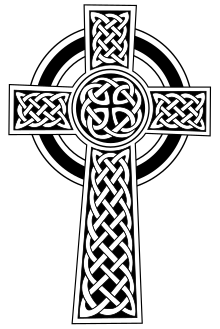Celts
The Celts were a large group of Caucasian tribes in Europe. They first appeared in the early Iron Age, around 1200 B.C. in Austria. The name 'Celt' comes from the Greeks. The Romans called them "Gauls". They came from the Hallstatt and La Tène cultures. Their culture and genes spread through much of Europe, and by the time the Greeks and later the Romans started emerging, the British Isles and parts of western, southern and eastern Europe were Celtic - the most prominent Celtic tribes were in Gaul. The Celts spoke Celtic languages. Today, the Celtic languages that remain are the Breton, Cornish, Welsh and Gaelic languages.

Celtic society and technology, although not as advanced as the Romans, was far from being primitive for its time. The Celts lived a way of life based on ethical codes and honor codes and had developed a culture of their own, full of unique drawings, sculptures, jewellery, folklore, and building designs and techniques. They were also skilled in blacksmithing, farming and diplomacy.
Celtic warriors would wear war paint and try to scare their enemies by shouting war cries. Tribes had different dress standards for battle; some warriors wore chainmail and/or leather armor, some wore only clothes and some were known to fight fully naked. They also had their own type of sword that was very strong and a shield that was very protective.
When the Roman Republic started expanding, the Gauls and the Romans became very hostile towards each other and clashed on many occasions; however, the Romans were eventually able to defeat them and ended up conquering most of the Celtic tribes in Europe and ruled them until the fall of the Western Roman Empire. Celtic tribes also fought among each other. After winning a battle, the Celts would cut off the heads of their enemies and take them home.[1]
During the fall of the Roman Empire most of the old Celtic land ended up being ruled by migrating Germanic tribes and they merged with Romano-Celtic stock (people with both Roman and Celtic ancestry) to eventually form several European nations of today e.g. Portugal, Spain, France, Belgium, Switzerland, Luxembourg as well as Southern and Western Germany. Territories that are still considered Celtic are Ireland, Wales, Scotland, Isle of Man, Cornwall and Brittany.
References
change- ↑ "How the Romans conquered Britain". BBC Bitesize. Retrieved 2019-01-09.